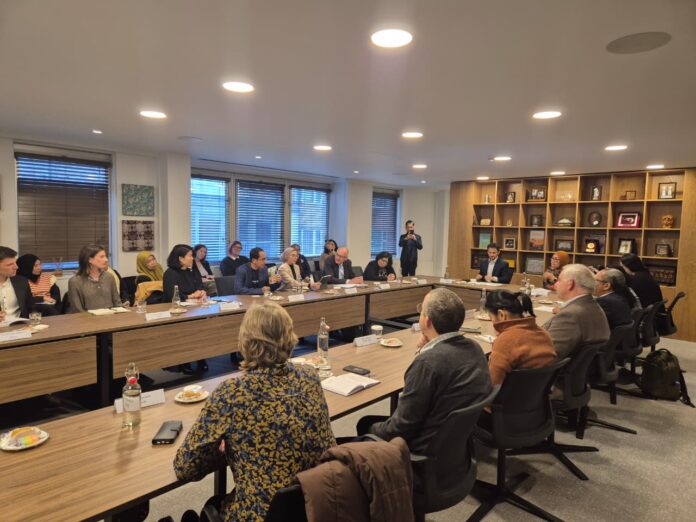Ecobiz.asia — Indonesian smallholder farmers voiced their concerns over the impact of global trade regulations, including the European Union Deforestation Regulation (EUDR), in a dialogue with UK industry players in London on Wednesday (Sept 17).
They stressed that global rules can only be sustainable if they involve those at the very end of the supply chain.
The dialogue, hosted at the Indonesian Embassy in London, was moderated by sustainable commodity governance expert Diah Suradiredja.
UK industry representatives attending the session included Cheryl Ellron, CEO of Ellron Consulting Services; Richard Laming, Head of Public Affairs at Ferrero UK; George Eddell from ADM; Fiona Wheatley, Central Responsible Sourcing Manager at Bakkavor; Paul Rooke, Executive Director of the British Coffee Association; Gary Lewis, President of the National Edible Oil Distributors Association (NEODA); and EFECA representatives Jonathan Gorman, Judith Murdoch, Phoebe Baker, and Conal Judd-English.
From Indonesia, participants included Diana Kosmanto, CEO of YEL 360 Coffee; Slamet Sudijono, CEO of Mahorahora; Raksa Ibrahim Permana, Economic Function Coordinator at the Indonesian Embassy in London; and Trade Attaché Ayu Siti Maryam.
In her remarks, Diah underscored the importance of listening to smallholders’ perspectives. “Too often, smallholders are spoken about but not spoken with. Today, we want to change that,” she said. She emphasized that smallholders are the backbone of Indonesia’s cocoa, coffee, palm oil, and rubber sectors, and must be part of global trade policy discussions.
Two female farmers, Agung Widiastuti from Bali and Cici Tiansari from Jambi, delivered keynote interventions.
Widiastuti, Chair of the Kerta Semaya Samaniya Cocoa Cooperative (KSS) in Jembrana, Bali, shared how her cooperative of more than 400 farmers has gained access to international markets. She highlighted the role of smallholders in advancing the Sustainable Development Goals (SDGs), from poverty reduction to climate action. “We want our work to continue to have a place at the world’s table,” she said.
Meanwhile, Cici Tiansari, a palm oil farmer from Sarolangun, Jambi, pointed to the difficulties smallholders face in meeting EUDR’s technical requirements, such as polygon mapping and digital documentation. “For big companies this may not be a problem, but for us it is very difficult. Even internet access is often unavailable in our villages,” she explained.
Without solutions, she warned, smallholders risk losing access to European markets. “Our hope is simple: please don’t leave us behind. Help us participate fairly and inclusively,” she said.
The forum served as a reminder that behind every product of cocoa, coffee, rubber, and palm oil are millions of smallholder families. By opening this dialogue in London, Indonesia hopes that global regulations such as the EUDR will be implemented more inclusively and reflect realities on the ground.
The dialogue with UK industry was part of the Indonesian Smallholders Roadshow across several European cities. Prior to London, the farmers met stakeholders in Brussels, Belgium, and will continue their engagements in Rome, Italy. ***





